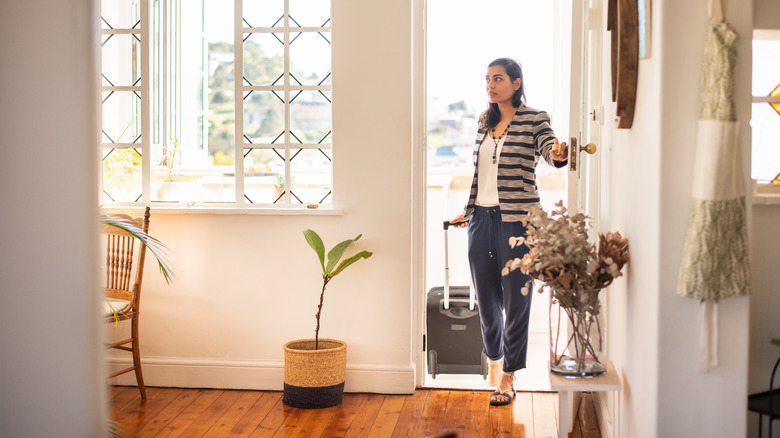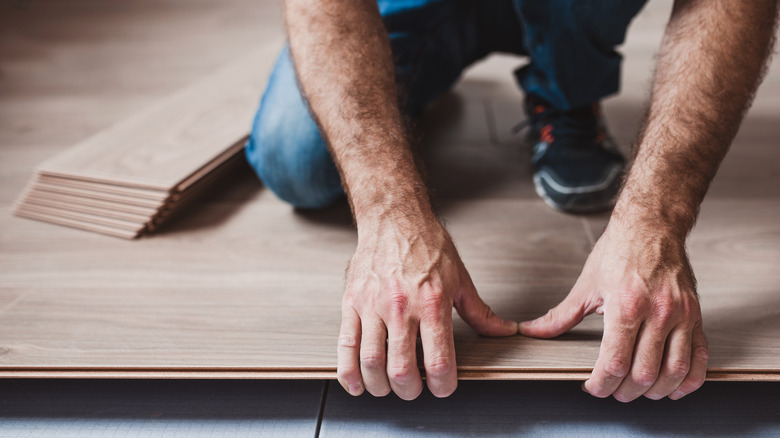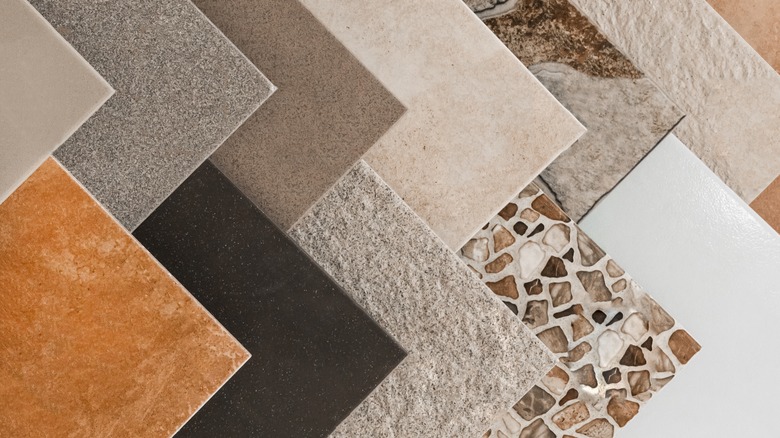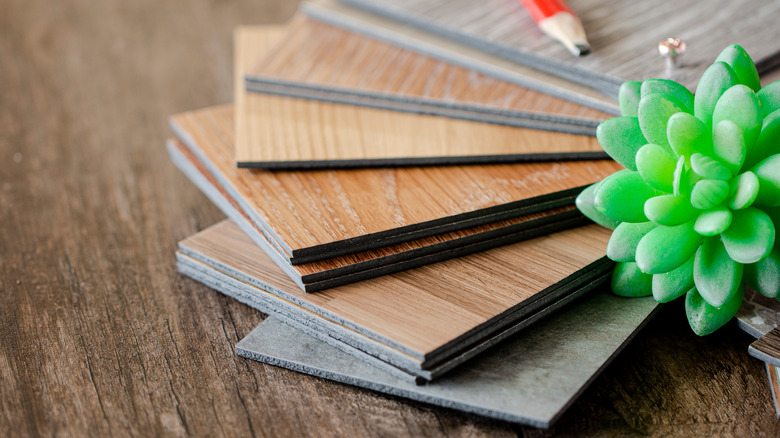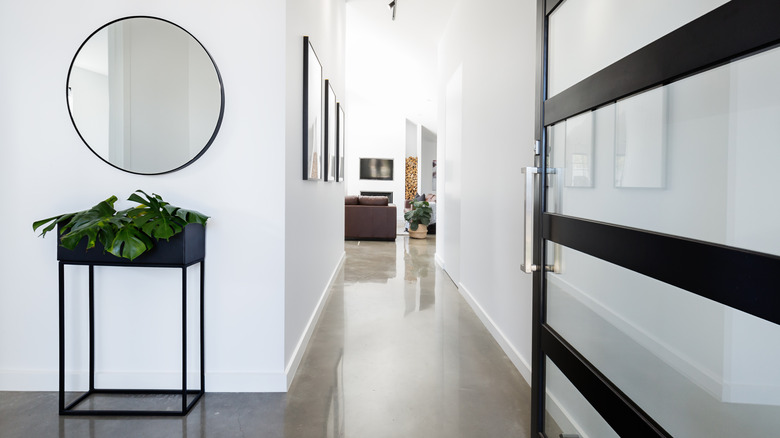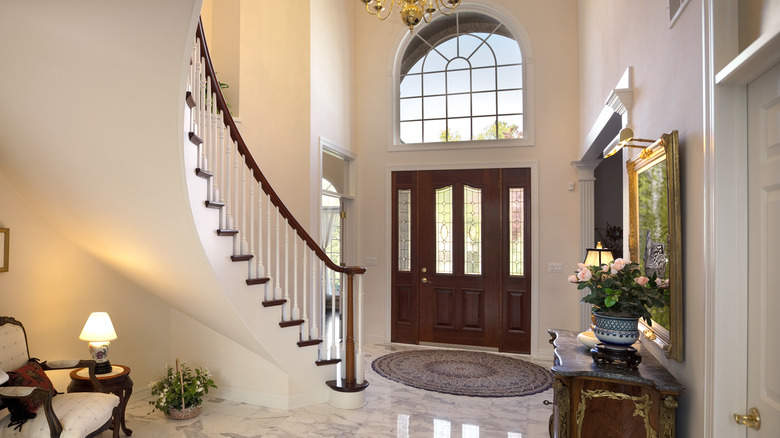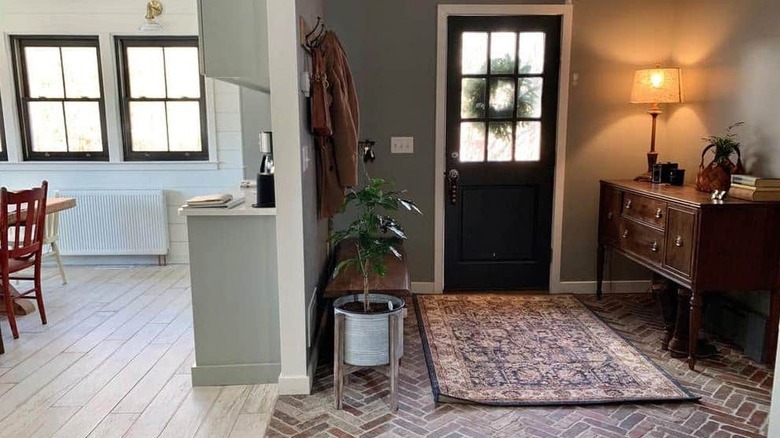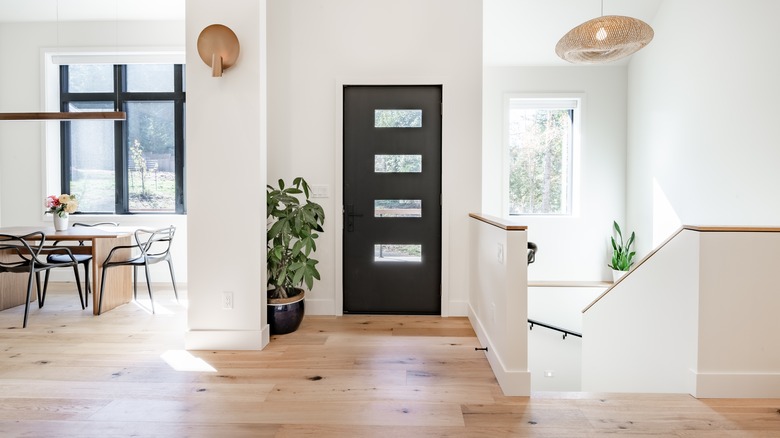The Best Entryway Flooring Options To Give A Great First Impression
The entryway of the home is a space that ideally strikes a balance of both style and function. You want your guests to be impressed upon arriving, but you also want to ensure that their dirty shoes don't create an irreparable mess. When deciding on floors for your entry, choosing a material that looks great — and stays looking great over time — is of the utmost importance.
Qualities to look for in entryway flooring will vary slightly depending on where you live, the type of people who frequent your home, and personal taste. But, in general, you will want to look for durability, which includes resistance to scratches, scuffs, and denting. You will also want to choose something that is easy to clean and maintain, as the entryway will inevitably see dirt more frequently than other parts of the home.And, of course, you will want to consider a floor medium that is largely moisture resistant, for any inclement weather that gets tracked inside. Keep reading to learn which entryway floorings have as strong of a design potential as they do longevity.
Laminate planks
Chances are you've mistaken laminate flooring for hardwood at least once, given how well it replicates the look. However, laminate planks used for flooring consist of four distinct layers, none of which are hardwood. First is a balancing back layer, then a core layer made of MDF or HDF. Next is a design layer that mimics the material of your choice, and then, the final wear layer, which protects all those beneath from damage. The wear layer offers durability and scratch resistance, which make laminate an excellent choice for high-traffic areas like your entryway. But, the design layer is what really gives it versatility in terms of style. No matter the look of your home, you can find a laminate option that impresses guests as soon as they walk through your door.
While laminate is a much more affordable flooring option when compared to natural materials like stone or hardwood, that affordability can come at some cost. The top layer will protect from simple spills, but more extensive moisture damage can be cause for concern — especially in an area of the home like the entryway. Planks rely on an interlocking system to seal gaps tightly, so you may want to leave it to a professional toinstall laminate flooring and ensure your entryway's longevity. If laminate seems right for you, you'll be glad to know that options are widely available at home improvement giants like Home Depot or Lowes, as well as from independent retailers who may offer a broader selection of specialty designs.
Porcelain tiles
If you're looking for flooring that will stand up to the tough conditions trudged through the front door of the home, look no further than porcelain tile. Porcelain has a specialized ceramic composition that is processed from fine clay particles. It gets fired under longer and hotter conditions than regular ceramic tile, which means it is dense, strong, and incredibly waterproof — a perfect combination for an entryway. And if a tile is ever damaged, it is easy to replace, unlike other floor types which would require more intensive repair.
If you live in a wet environment and your floors are exposed to moisture often, porcelain tile would be an excellent choice. Moreover, porcelain tile comes in a ton of different colors, shapes, sizes, and designs. They can be playful, creative, and colorful, or even mimic natural stone, like marble.
While porcelain tile ticks many boxes for entryway flooring, its professional installation tends to be expensive. The high cost for expert tile installation (compared to a material like laminate) comes from how much additional material and preparation is required for each square foot of tile to be laid. Between the expense for tile backer board, adhesive, grout, and labor, you can see how the costs easily add up. But that said, porcelain tile adds value to the home and can save you money in the long run, due to its durability.
Luxury vinyl planks and tile
Luxury vinyl plank flooring (LVP) and luxury vinyl tile (LVT) are both materials that are manufactured with more layers than traditional vinyl sheet flooring. The rigid construction of luxury tile compared to flimsy regular vinyl makes it incredibly hardwearing and comfortable underfoot. It's also waterproof and therefore a choice flooring material for entryways that endure constant traffic and exposure to water. Much like laminate, luxury vinyl is often produced to mimic the look of wood, stone, and other natural floor materials. This means it can work in all different kinds of home climates and styles.
Like its name suggests, luxury vinyl comes with a luxury premium. Compared to sheet vinyl, it costs much more per piece, just for materials. Your old floors can be removed and replaced entirely with luxury vinyl. But did you know that you can install luxury vinyl planks directly over hardwood floors in your entryway? This is a smart way to replicate the look of beautiful hardwood flooring if you already have it, while preserving its integrity and maintaining your home resale value. Also similar to laminate, LVP and LVT are installed with interlocking edges. Professional installation will ensure that there are no gaps between tiles or planks, meaning near total protection from any possible water damage. Luxury vinyl planks and tiles can be found through various online retailers, like Cali Floors.
Polished concrete
If you're looking for entryway flooring that is impervious to scratches, spills, and more, polished concrete flooring may be right for your space. Polished concrete is created when regular concrete is set, sealed with special chemical products, and then mechanically smoothed through a grinding process. The resulting finish yields a low-maintenance floor, ready to take on all of the regular exposure to shoes, dirt, and water expected at the entrance of a home.
Undyed concrete is the most budget friendly and would be a nice complement to modern home styles. But concrete can also be dyed different colors while it's being mixed, or it can be stained or stamped once dry. Both options make the material customizable to many different design aesthetics. However, coloring or staining concrete can run up costs quite a bit, which is something to consider if you are trying to keep your entryway flooring project as affordable as possible.
Other caveats to consider are that some may find polished concrete uncomfortably hard and cold to walk on — and it can be dangerous for homes with small children or elderly folks because of its rigidity. It is also important to note that even when concrete is expertly installed, it can be prone to cracking in humid conditions. So, it may not be the best choice for homes in such climates. That being said, polished concrete installed with professional tools and expertise, in an appropriate climate, will be a long-lasting, home-improving investment.
Granite slab or tiles
Granite is a natural stone sourced from the earth, which you may recognize from its regular use as kitchen countertop material. However, granite also makes an excellent flooring choice, especially in a place like the home entryway. When properly sealed, granite acts as a visually impressive and stylish floor option, able to withstand heavy foot traffic and exposure to dirt and water.
If you're browsing natural stone flooring options, and you have a substantial budget, you may immediately jump to the thought of a luxurious marble foyer. But one of the cons of marble flooring is that it is considerably higher maintenance than granite, due to its higher natural porosity and susceptibility to staining. Granite is still porous, but is ultimately more durable and lower maintenance than marble. On average, granite also tends to be more affordable than marble. However, depending on the stone quality and format (slab versus tiles), pricing can vary.
Whether you opt for slab granite or granite tiles, you will want to rely on professional installation. Expert install, combined with the cost of materials, will be more expensive than flooring like laminate or vinyl. However, granite is more likely to stand the test of time without any damage, and it will ultimately increase your home's resale value. It also comes in a gorgeous breadth of naturally-occurring colors, like different white and black patterns, or even red and green varieties. This means that any granite you choose will be totally unique to your home.
Brick paver tiles
Brick is a reliable, longstanding material used in construction projects. Created from clay that is shaped, dried, and then fired at high temperatures, you may be more familiar with brick's exterior applications, like in building facades, garden walls, or walkways. But an interior brick entryway can create not only a striking, unexpected impression in your home — it makes a practical flooring solution, too.
In addition to its durability, brick has natural color and texture variation, so it will not show wear easily when used in a well-trodden entry. This is even more true for salvaged or reclaimed brick, which can be used to create an intentionally distressed look when laid as floor tiles. If you're able to get your hands on enough of this second-hand brick, it can be more cost effective than buying new.
Brick can be more uneven than other flooring choices, so this may be a safety consideration, depending on who is frequenting your home. And though the rustic material would work well with farmhouse or traditional designs, it may not suit other housing styles as seamlessly. And it will also require sealing to weather regular use and moisture in the entryway. Brick flooring is one of the more DIY-able entryway flooring choices, if you have certain tools at your disposal. With a proper foundation, adhesive, and grout, you can install brick in a traditional layout, or use pre-styled herringbone pattern brick sheets to really impress your guests.
Engineered hardwood
Most hardwood would be a no-go in a high-traffic area, like the entryway, because it is especially susceptible to moisture damage. However, engineered wood is crafted to offer the coveted look of traditional hardwood, while being more durable and resistant to water. Engineered hardwood planks consist of thin hardwood layers that sandwich other layers of plywood. This construction makes it so that the flooring will not expand or warp as easily if exposed to excess water and humidity.
By using engineered hardwood just inside of your front door, guests will receive a warm welcome, and you will be spared the concern of expensive to fix scuffs, scratches, or stains. The innovative product is relatively easy to upkeep and clean, and because it looks exactly like hardwood, its varied grains and finishes will work across most housing styles. It is also tends to be more affordable on average than traditional wooden floor planks.
The thin layer of actual wood on top does mean that engineered flooring cannot be refinished like real wood. However, it can be upkept for long periods of time with proper installation, consistent maintenance, and care. Like laminate and premium vinyl, some engineered hardwood products utilize a click-lock system for installation. Others will require stapling, nailing, or gluing to your subfloors. If you have some know-how, you may be able to DIY engineered wood flooring in your entry. But if you're not super confident in your flooring skills, we recommend leaving the install to the professionals.
